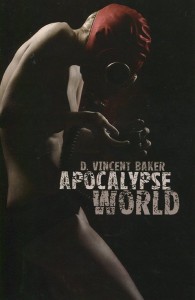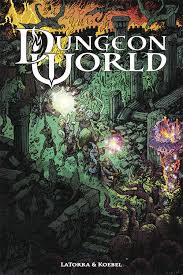Aha! I did mess up the numbering for the last three #RPGaDAY, Last Year posts, but that’s because I was travelling about this time last year and had a whole bunch of posts lined up and squirted out into the ether, one day a year ago. Apparently I’m back from wherever the hell I was ((Probably camping in Acadia National Park.)) and thought it was high time to tell you about My Favorite RPG No One Else Wants To Play. Oddly, it hasn’t changed. It’s still Apocalypse World.
 I really like the system ((See this post at G+ and the footnote at this post)) and how the AW book delivers information to the reader. But we played the not-quite-final version of Dungeon World well before we ever played AW. Our Dungeon World game was quite an awful experience and I think some of that tainted our Apocalypse World game.
I really like the system ((See this post at G+ and the footnote at this post)) and how the AW book delivers information to the reader. But we played the not-quite-final version of Dungeon World well before we ever played AW. Our Dungeon World game was quite an awful experience and I think some of that tainted our Apocalypse World game.
With AW, there’s all these other characters in the world to interact with, all these interactive situations where players can just go and the world works. Characters in AW don’t have to be opposed to each other; they can function as a team – some people in my group absolutely hate inter-party conflicts ((Fighting between the characters, that is. It’s okay if some characters have different goals, but when one player’s character attempts to kill another’s, that’s right out.)), and even still, AW can work.
 Dungeon World, because it sets up the game as a group of dungeoneers, separates the player’s characters from the “other characters†of AW. We ran the Bloodstone Idol adventure, which is a straight up dungeon delve. Your dungeon explorers may come into contact with a mad sorcerer, but there’s nothing that makes that “boss monster†as real as Midnight, a leader of wasteland scavengers, that you have to deal with in AW. This probably comes from one of the core principles of AW that doesn’t transfer over to DW: name everyone, make everyone human. When your characters come face-to-face with Midnight, they know her name. This implies that they’ve heard of her before. Maybe they’ve encountered some of Midnight’s men and heard her name that way. Our dungeoneers don’t know the name of the goblin chieftain that’s shooting arrows at them. AW focuses on interaction with others, DW focuses on interaction with the environment. When this happens, AW becomes a role-playing game, DW becomes a game where you’re moving pieces on a board and rolling, occasionally. ((Which is exactly what happened in our game. About three chambers into the dungeon and nobody was speaking in character. “I go over to this wall and peek around the corner.†Stuff like that. So when we got to the room where if anyone spoke these statues would come to life and attack us (which means that it just triggers a fighting sequence instead of any actual role-playing), the adventurers were just mute pieces moving around a board. No living statues. No nothing.))
Dungeon World, because it sets up the game as a group of dungeoneers, separates the player’s characters from the “other characters†of AW. We ran the Bloodstone Idol adventure, which is a straight up dungeon delve. Your dungeon explorers may come into contact with a mad sorcerer, but there’s nothing that makes that “boss monster†as real as Midnight, a leader of wasteland scavengers, that you have to deal with in AW. This probably comes from one of the core principles of AW that doesn’t transfer over to DW: name everyone, make everyone human. When your characters come face-to-face with Midnight, they know her name. This implies that they’ve heard of her before. Maybe they’ve encountered some of Midnight’s men and heard her name that way. Our dungeoneers don’t know the name of the goblin chieftain that’s shooting arrows at them. AW focuses on interaction with others, DW focuses on interaction with the environment. When this happens, AW becomes a role-playing game, DW becomes a game where you’re moving pieces on a board and rolling, occasionally. ((Which is exactly what happened in our game. About three chambers into the dungeon and nobody was speaking in character. “I go over to this wall and peek around the corner.†Stuff like that. So when we got to the room where if anyone spoke these statues would come to life and attack us (which means that it just triggers a fighting sequence instead of any actual role-playing), the adventurers were just mute pieces moving around a board. No living statues. No nothing.))
Dungeon World didn’t work well in the dungeon. Last year, I played in a DW game and it worked well when we were at the Elf Queen’s court, negotiating, and at the village where we had to confront someone fleeing from the village and the people assaulting her/guarding the village. Both of these scenes would have fit into an AW game. We didn’t go into a series of caves or tunnels where we were cut off from the other people in the world, and it worked. If we had, we’d be forced to bounce off each other.
Which leads me to why I much prefer the Hx of Apocalypse World to the bonds of Dungeon World. In general: Hx shows the relationships between characters, bonds exist to set up conflict between them. Sure, there are a few Hx with “you left me bleeding and did nothingâ€, but that’s in the past, and not every character has those. Each character in DW has a bond that is about some sort of current conflict: “you are keeping an important secret from meâ€, “you know incriminating details about meâ€, and “I am working on converting you to my faith†as examples. Everything is current and everything is set up to foster dysfunction. ((Ryan Macklin speaks a bit about this at his website: http://ryanmacklin.com/2012/05/antagonist-bonds-toxicity-dw/ )) …which I suppose is how DW deals with three or four characters, deep underground, with nobody to talk to but themselves. But the linear dungeon crawl from Room 3 to Room 4 to Room 5 isn‘t really a good venue to discuss how St. Cuthbert is a really kewl dood you really should follow, room after room after room. ((Also, in that DW game with the Elf Queen and all, by the time we went through character creation and bond assignments, my character went from someone nice to a manipulative dick.))
But in Apocalypse World, we’re making it about the characters and how they exist and survive and function in this setting. Even with trying to get the focus on this, and having a great time running Apocalypse World, there were a few missteps I took that helped to tank the campaign. (Our apocalypse was Poison Ivy’s fantasy come to life: nature went wild and choked the world in plant growth. We were on the island of Manhattan.) We had a Hocus, a cult leader, and two other players who weren’t cultists. Now, when I decreed this, I meant that the other two weren’t people that the Hocus could push around, but I made the mistake of referring to them as outside the Hocus’ inner circle (when they should have been the inner circle) and having a believer assigned to the players to watch over them and make sure they didn’t step out of line. So right off, I started adding toxicity to the mix between the players’ characters instead of introducing conflict between the characters and the others in the world. ((Sorry, gang.)) We also didn’t have a hardhold to start in, so we went with a travelling band of cultists on the island, which meant that when there were conflicts between the Brainer and one of the cultists, it was a proxy conflict between the Brainer and the Hocus.
So that didn’t end well.
By the time the group stopped the game, we had the cult (and group as a whole) dealing with a warlord, a hardhold, and about to take on the Mayor of New York, so there were plenty of people to bounce off of, but we started with an unstable foundation in the group, and that snowballed downwards.
Despite that, I really love the system and I’ve seen/heard other groups play the game with some fantastic AP reports. I’d love to play it again, but I feel the earlier DW game and the way last year’s AW game imploded have soured *World on the other players in the group.
Any additional comments you’d like to well, add?
Yes! Thanks, me.
While I seriously think the reason why people in the group don’t want to play AW again is the inadvertent toxicity that I engineered at the get-go, one person I spoke to after that said they didn’t fell like their character was heroic. And to be honest with myself, I think there is something of that with not having a place to defend or protect, which meant that the protagonists didn’t have anything concrete to care about. We didn’t start off with a hardhold and the Hocus chose a nomadic cult (which meant the others were nomads as well). Instantly there wasn’t anything concrete for our Faceless or Brainer to grab onto to protect or defend or tie to themselves; the other cultists, maybe, but they were all the Hocus’ flock. ((And to complicate things, the Hocus didn’t want to lead them, they just followed him — further distancing from things to tie the protagonists to an anchor.))
I strongly feel that all three players in the game would enjoy playing Apocalypse World, if we had their protagonists tied more to something in the setting, rather than just floating from settlement to settlement. But because of our playthough of Dungeon World and how our last Apocalypse World game ended, I don’t think I’d be able to get all of us back to that particular game again. ((Plus, during daylight savings time, we’ve got a three-hour time difference between us.))


 I’m going to make this a different answer than the one for the “favorite RPG of all time†writing prompt. ((This will be on the 31st.)) I will have to go with Apocalypse World’s system: roll 2d6 + stat, succeed on a 10 or higher, succeed at a cost on a 7-9, fail at a 6 or lower. But sometimes it’s succeed at a cost at 10+, succeed at a greater cost at 7-9. The actions–moves–often are written with options your character can take with the ones you don’t take acting as prompts for the GM. Here’s a typical example:
I’m going to make this a different answer than the one for the “favorite RPG of all time†writing prompt. ((This will be on the 31st.)) I will have to go with Apocalypse World’s system: roll 2d6 + stat, succeed on a 10 or higher, succeed at a cost on a 7-9, fail at a 6 or lower. But sometimes it’s succeed at a cost at 10+, succeed at a greater cost at 7-9. The actions–moves–often are written with options your character can take with the ones you don’t take acting as prompts for the GM. Here’s a typical example: